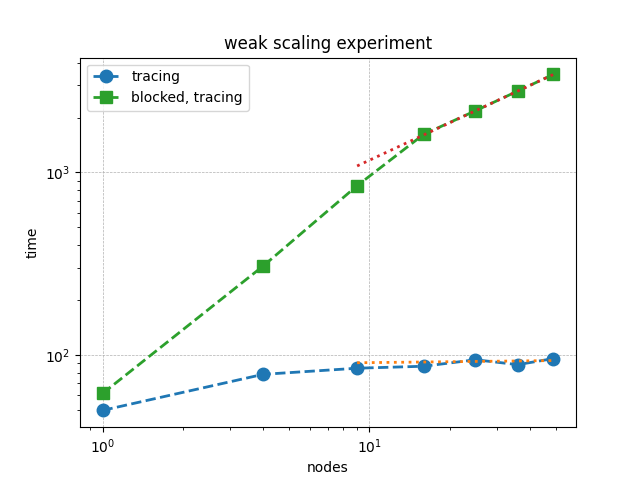Performance Effect of get() Outside of a Task
This is a weak scaling plot of
Red-Black Gauss-Seidel iteration for Poisson’s Equation in 2D.
The green squares are the weak scaling results when get() is used outside of a task.
Already at fifty nodes there is a 30X performance difference. This blocked solution time
scales as \(\left(\texttt{nodes}\right)^{0.7}\). So this difference will only get worse.

Forcing Bulk-Synchronousity in Your Code
Certain operations like future::get block the caller until the result is available.
While an action is blocked, no further tasks can be launched and execution resources may become idle.
using namespace flecsi;
std::size_t sub{3};
std::size_t ita{0};
static exec::trace t; // trace object
t.skip(); // skip tracing first time through loop
do {
auto g = t.make_guard(); // turn tracing on for enclosing do loop
for(std::size_t i{0}; i < sub; ++i) {
s.execute<task::red>(m, ud(m), fd(m));
s.execute<task::black>(m, ud(m), fd(m));
}
ita += sub;
s.execute<task::discrete_operator>(m, ud(m), Aud(m));
auto residual = s.reduce<task::diff, exec::fold::sum>(m, fd(m), Aud(m));
err = std::sqrt(residual.get());
flog(info) << "residual: " << err << " (" << ita << " iterations)"
<< std::endl;
} while(ita < max_iterations.value());
Removing Bulk-Synchronousity from Your Code
Here we pass the future to the print_residual task. Calling get() inside
a task is correct as it allows the runtime to continue with other tasks while
print_residual is waiting on the reduction.
using namespace flecsi;
std::size_t sub{3};
std::size_t ita{0};
static exec::trace t; // trace object
t.skip(); // skip tracing first time through loop
do {
auto g = t.make_guard(); // turn tracing on for enclosing do loop
for(std::size_t i{0}; i < sub; ++i) {
s.execute<task::red>(m, ud(m), fd(m));
s.execute<task::black>(m, ud(m), fd(m));
}
ita += sub;
s.execute<task::discrete_operator>(m, ud(m), Aud(m));
auto residual = s.reduce<task::diff, exec::fold::sum>(m, fd(m), Aud(m));
s.execute<task::print_residual>(residual, ita+sub);
} while(ita < max_iterations.value());
Note
Residual tolerance termination conditions are usually employed for solvers, but FleCSI does not yet support futures in this way.
void task::print_residual(future<double> residual, std::size_t ita) {
double err = std::sqrt(residual.get());
std::cout << "residual: " << err << " (" << ita << " iterations)"
<< std::endl << std::flush;
}
When to Call get() Outside of a Task
Basically, never call get() outside of a task.
If you are using it in initialization once, that probably won’t hurt much.